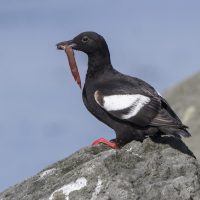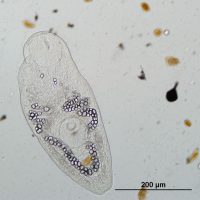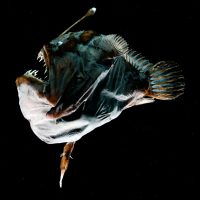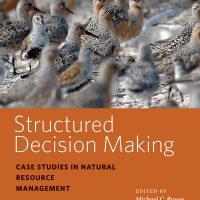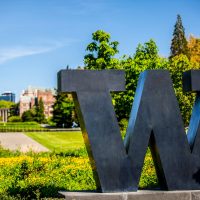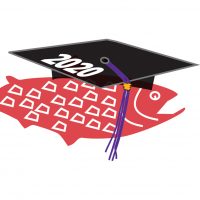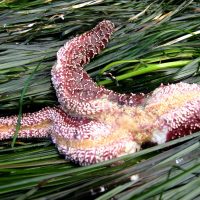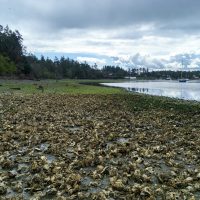Filter Results
Community science effort helps UW researchers understand local seabird populations
For nearly two decades, volunteers on Whidbey Island have been monitoring a curious little seabird—the pigeon guillemot, small in size, black with white patches on the wings and a fire-engine-red mouth and feet. Using binoculars, they observe and record the comings and goings of the island’s resident seabirds along the seaside cliffs.
Pigeon guillemots have been identified as a Puget Sound indicator species due to their abundance throughout the region, but what they might indicate is not yet clear.
New studies show how to save parasites and why it’s important
An international group of scientists has laid out an ambitious global conservation plan for parasites. A related paper led by the University of Washington found that responses of parasites to environmental change are likely to be complex, and that a changing world probably will see both outbreaks of some parasites and a total loss of other parasite species.
Read moreDeep-sea anglerfishes have evolved a new type of immune system
Deep-sea anglerfishes employ an incredible reproductive strategy. Tiny dwarfed males become permanently attached to relatively gigantic females, fuse their tissues and then establish a common blood circulation. Now scientists have figured out why female anglerfishes so readily accept their male mates. Their findings are published July 30 in Science.
Read moreBig decisions: New book examines case studies in “Structured Decision Making”
In their most recent book, Sarah Converse (unit leader, USGS Washington Cooperative Fish and Wildlife Research Unit, and UW associate professor in Aquatic and Fishery Sciences and Environmental and Forest Sciences) and her co-editors explore how managers can use a structured decision making approach to aid in solving natural resource problems.
Read moreJacqueline Padilla-Gamiño Recognized by UW Center for Latino Health
The UW Center for Latino Health has recognized 32 UW Latinx faculty for scholarly achievements, including Jacqueline Padilla-Gamiño, assistant professor at the UW School of Aquatic and Fishery Sciences, who has been honored for the second year in a row. This annual event honors the scholarly achievements of Latina and Latino faculty across the three campuses of the University of Washington.
Read moreStatement from SAFS Leadership
The recent events make us feel heartbroken, angry, and even more acutely aware that our pursuit of achieving our commitments and goals for an equitable and safe School is paramount. We will recommit ourselves to achieving these commitments and goals, and will continue down the path we have decided upon, no matter what.
Read moreSpring 2020 Graduation
Congratulations to all of our graduates! View our graduation page to learn more about them and their accomplishments.
Read moreA rising tide of marine disease? How parasites respond to a warming world
Warming events are increasing in magnitude and severity, threatening many ecosystems worldwide. As the global temperatures continue to climb, it also raises uncertainties as to the relationship, prevalence, and spread of parasites and disease. A recent study from the University of Washington explores the ways parasitism will respond to climate change, providing researchers new insights into disease transmission.
Read moreSAFS researchers and graduates coauthor international letter addressing transboundary mining pollution
A number of UW researchers have joined an international group of science and policy experts to publish a joint commentary in the journal Science, calling on U.S. and Canadian leaders to address damages and risks caused by Canadian mine pollution flowing downstream into U.S. states. Led by researchers at the University of Montana, the cohort included five graduates and one PhD candidate from the UW School of Aquatic and Fishery Sciences
Read morePacific oysters in the Salish Sea may not contain as many microplastics as previously thought
In a recent interdisciplinary study, University of Washington researchers at the School of Aquatic and Fishery Sciences, Department of Chemistry and Department of Materials Science and Engineering used advanced methodologies to accurately identify and catalog microplastics in Pacific oysters from the Salish Sea. They have discovered that the abundance of tiny microplastic contaminants in these oysters is much lower than previously thought. The findings were published in January in the journal Science of the Total Environment.
Read more